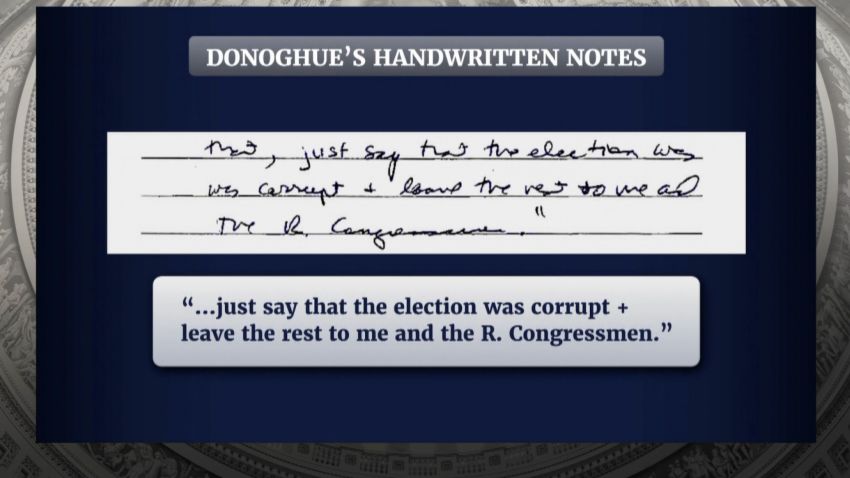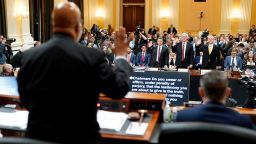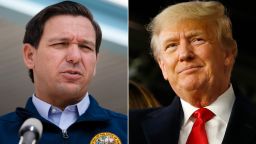Editor’s Note: Elliot Williams is a CNN legal analyst. He is a former deputy assistant attorney general at the Justice Department and is currently a principal at The Raben Group, a public affairs firm. Follow him on Twitter @elliotcwilliams. He was a Justice Department trial attorney from 2004-2007 and deputy assistant attorney general from 2013-2017. The views expressed in this commentary are his own. View more opinion on CNN.
Walt Disney once said that carrying out one’s vision “requires people to make the dream a reality.”
Former President Donald Trump had a vision: to overturn the results of a free and fair election in 2020 and to remain in power for at least another term. On Thursday, we learned just how close he came to having people he handpicked at the Justice Department make that vision a reality.

Thursday’s hearing of the select congressional committee investigating the January 6 attack featured testimony from three men who are not household names but held jobs of indescribable importance in the American legal system: Jeffrey A. Rosen, former acting attorney general; Richard Donoghue, former acting deputy attorney general; and Steven Engel, former assistant attorney general for the office of legal counsel.
During my tenure at the Justice Department, I worked closely with several men and women who held each of these jobs. As the three positions oversee profound issues that touch on national security, human rights and public safety, even casual decisions by anyone holding them can affect the lives of millions of Americans.
Across five hearings, the committee has effectively laid out its central theory: that Trump led a months-long, coordinated, multi-step effort to overturn the results of the 2020 election and stop the transfer of power. The latest hearing illustrated a particularly noxious tactic: attempting to cycle through and discard senior Justice Department leaders until he ended up with complicit ones.
In their testimony, the three were explicit about the President’s disgraceful conduct. In perhaps the most vivid moment of the day, Donoghue – citing notes he took at the time – testified that in a phone call, President Trump directed him and the Justice Department to “just say the election was corrupt and leave the rest to me and Republican Congressmen.”
At this point, I’m not sure which is worse: a president trying to bully the Justice Department into carrying out an investigation, or his trying to use it as his mouthpiece.
It might not be intuitive to all that there should be a wall between elected officials and prosecutors. Many local prosecutors run in partisan elections, and in the federal system, the president – as political a figure as any – appoints the attorney general. Still, in order for the public to have faith that the Justice Department’s work is carried out without the appearance of improper political influence, there must be a clear separation between its work and that of the White House.
The principle is nothing new or novel – Trump’s own White House counsel Don McGahn laid it out in a January 27, 2017 memo to all White House staff, in which he stated clear limitations on communications between White House staff and Justice Department personnel.
Rosen and Donoghue spoke today of participating in almost daily meetings or phone calls, initiated by the President, in the weeks preceding January 6. Those calls were flagrant violations of longstanding norms of how government is conducted.
And when Trump wasn’t getting the outcome he wanted from the two, he simply sought to cast them aside.
Trump’s attempts to replace Rosen with Jeffrey Clark – whose home federal agents searched on Thursday – were particularly troubling. Clark had been the author of a proposed draft letter to several states that falsely claimed that the DOJ had found voting irregularities there and directed them to convene special legislative sessions. Rosen, to whom Clark had emailed the letter for his signature, testified that it would have had “tremendous constitutional, political and social ramifications for the country.”
Clark has refused to answer questions about the letter, citing his Fifth Amendment right against self-incrimination.
It is now clear that noncompliant senior staff in the department might have been the one thing stopping Trump from shoving the country headfirst into a constitutional crisis. Sadly, the revelations at Thursday’s hearing should shock no one. Trump, while in office, built plenty of experience alienating, sidelining or firing top law enforcement personnel who chose not to carry out his bidding.
For instance, Trump forced the resignation of Byung “BJay” Pak, a United States Attorney in Georgia whom Trump believed was not doing enough to address false claims of election fraud (and who testified before the committee on June 13).
Notably, Rosen had the title “acting” attorney general on January 6. This was because his predecessor, William Barr, had days before resigned after repeatedly failing to break through to Trump that his claims of election fraud were “bullshit.” (Trump had also forced out the last Senate-confirmed attorney general before Barr, Jeff Sessions, following frustration that Sessions recused himself from overseeing the Mueller investigation.)
And before January 6, there was former FBI Director James Comey, from whom Trump allegedly demanded “loyalty”; Deputy Attorney General Rod Rosenstein, whom Trump publicly criticized for appointing a special counsel to investigate meddling in the 2016 election; FBI Director Christopher Wray, who is reported to have considered resigning after pressure to make senior staff changes at the FBI. And on and on.
I hope we never see another January 6. But Thursday’s hearing was a reminder how perilously close we were to two additional disasters that week in the days leading up to January 6. First, had Trump gone through and replaced Rosen with Clark, untold numbers of Justice Department leaders would have resigned, leaving a leadership vacuum in a critical government body in the days in which America needed it more than ever.
More importantly, if allowed to lead the department, Clark may well have been the legal enabler who allowed Trump’s unlawful vision to come true.
It’s safe to say that America was a few resignations away from a coup.
Trump was incredibly close to seizing power in defiance of democratic norms and creating an unimaginable crisis for the nation. America is just lucky he didn’t have the right people in place.







